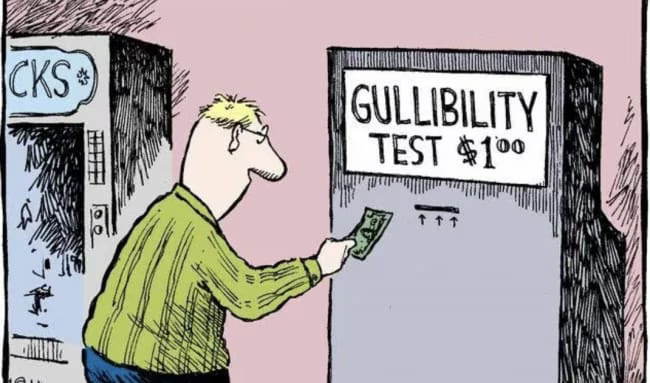Our Problem is Gullibility, Not Disinformation

I think we’ve lost the plot on disinformation. It’s not the attacks that are the problem. It’s the fact that too many Americans are willing to believe almost anything.
Ideally we’d reduce both the attacks and the vulnerability.
Of course it would be nice to have fewer attacks. Of course it would be nice to keep attacks from being used against higher numbers of vulnerable people. But ultimately the problem is the vulnerability itself.
Bad ideas are worse than bad code because they’re naturally contagious.
This is easier to see in the information security world. If you have a target that will run any code that it’s given, you cannot spend all of your energy making sure it doesn’t receive any code. Part of your plan has to be making sure it’s not so eager to do so. We call that patching.
It’s the same with people. We need to do more than control bad ideas; we need to patch our population against them.
Trade school doesn’t immunize against specious ideas.
For people, patching means education. And not the worker-prep kind of education where you learn how to be an obedient and productive office worker, but the kind that teaches the fundamentals of how things work—from physics to psychology, and from physiology to philosophy.
Controlling bad code, or bad information is tactically valuable, but it’s not a solution. If you have half a billion people who will believe and act upon any idiotic thing they are told, attackers will always find a way to deliver those bad ideas.
We see this with scammers today. We block scam phone calls, the attackers start texting > instead. We block text scams, they start sending physical mail > to people’s addresses. At some point they’ll just show up at your door like Jehovah’s Witnesses.
Bad ideas will find targets eventually. If we want to survive, we have to reduce the number of susceptible targets. This is why I’m pessimistic > about the American union.
Millions don’t believe in vaccination More >
Millions don’t believe in manmade climate change More >
1 in 5 Americans can’t name a branch of government More >
41% of Americans think Jesus will return to the Earth by 2050. More >
45% of Americans believe in ghosts and demons. More >
Only two-thirds of 19-24 year-olds believe the Earth is definitely a sphere. More >
This is the deeper problem.
Facebook and Twitter are just the marketplace. The problem is the customers.
We can blame Facebook and Twitter all we want, but to do so a distraction and a copout. It allows us to avoid a much more terrifying truth, which is that we’re becoming a nation of idiots. Ignorant people cannot survive in a system of government that allows them to behave against their own self-interest, because they will.
We need to reduce our attack surface for bad ideas.
Ignorance and freedom are in direct competition, and it’s much easier for a population to regress into authoritarianism than to become educated. The saddest part is that we’re not even talking about the problem. We’re just talking about how people are taking advantage of the problem.
Controlling the spread of bad ideas is not a strategy. We need to patch if we want to survive.
Notes
To be very clear, I find the fight against mis/disinformation to be extremely interesting, and extremely valuable. And I regularly talk about and praise the people who are doing this critical work. All I’m saying is that if we have an ignorant population it eventually won’t matter.